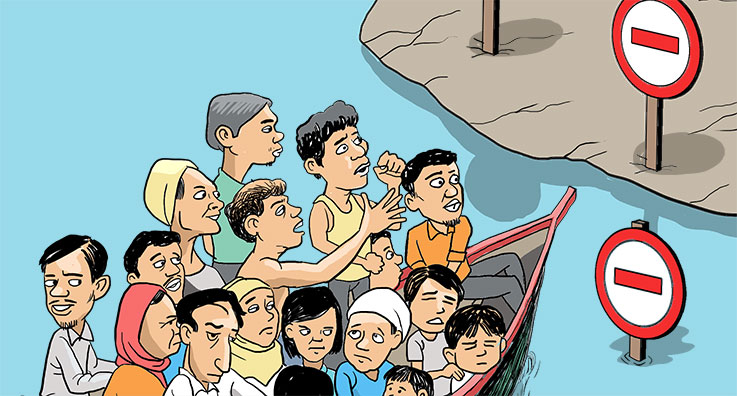I began this writing from a personal concern that emerged within me as an Acehnese individual working within the humanitarian sector, particularly in direct contact with the refugee community. Not taking a biased stance, I aim to provide a fair perspective on this rather complex issue.
Recently, the Rohingya refugee issue has been widely discussed by netizens due to the viral spread of a video depicting a regrettable mob attack carried out by a combined group of local university students (Post 2023).
The virality of this video sparked outrage among netizens towards the inhumane treatment conducted by these students. Unfortunately, this incident seemed to portray how the Acehnese people treat Rohingya refugees.
However, the reality is that since the entry of Rohingya refugees into Aceh in 2015, they have been warmly welcomed as a humanitarian solidarity gesture, especially since most of them are Muslims. This can be evidenced by observing the narratives that emerged in the early years of the Rohingya's arrival in Aceh through social media channels.
For instance, an article published by Detik.com in May 2015 showcased how local residents organized activities such as competitions involving Rohingya refugees as a form of mental therapy for the trauma they experienced (News.detik.com,2015).
Another article by CNN Indonesia in May 2015 reported the enthusiastic response of Acehnese people in providing assistance in various forms, including food, clothing, and even their harvests (CNN Indonesia, 2015).
| Baca juga: Donasi dengan Tepat: Belajar dari Pengungsi Suriah |
This compassionate reception stemmed from the massive aid received after the 2004 tsunami. However, recent media portrayals seem to disregard the Acehnese community's acceptance of Rohingya refugees. The question arises: why did this happen?
Where there's smoke, there's fire—this might be an appropriate saying to describe the incident. In my view, the mob attacks against Rohingya refugees are an accumulation of fear and disappointment experienced by the Acehnese people towards the government and the narratives propagated on social media.
While not justifying the mob attacks, intriguingly, the student group gathered Rohingya refugees in front of the Regional Government Building as a protest against the government's neglect in handling the Rohingya refugee issue.
By accumulation of fear and disappointment, I mean the proliferation of hate speech through social media, which has fueled grassroots community reactions towards the behavior of Rohingya refugee communities.
For example, the circulation of fake videos depicting protests for habitation land by Rohingya refugees with a government building backdrop in Malaysia, emergence of anonymous accounts posing as UNHCR (United Nations High Commissioner for Refugees) on various platforms demanding living islands for Rohingya refugees in the name of humanity, and other videos displaying arrogance among Rohingya refugees rejecting local aid (BRIN, 2023).
These provocative narratives have influenced a change in local attitudes towards Rohingya refugee communities. Additionally, imaginative narratives related to global geopolitics have drawn comparisons between Rohingya refugee communities and early Israeli people seeking help in Palestine and later expelling those who aided them, further fueling local fears.
Meanwhile, the accumulation of disappointment refers to the government's neglect, both at the central and local levels, in addressing this issue, leading to social disparities between refugees and the local population.
Since the arrival of Rohingya refugees in Kuala Langsa, East Aceh, in 2015, the government has only provided temporary shelter assistance without considering infrastructure facilities (REPUBLIKA, 2015).
Furthermore, the lack of clear demarcation between local settlements and refugee shelters has led to new conflicts among them, compounded by language barriers and cultural differences. Although basic needs such as prayer rooms, sanitation, children's play areas, education facilities, and other supporting services were eventually fulfilled through aid from concerned humanitarian NGOs.
Another point of disappointment, voiced by the local community, is the economic issue, where refugee communities receive comprehensive aid, including health assistance, proper free meals, and even monthly allowances for daily needs obtained from specific humanitarian agencies for refugees such as UNHCR and IOM.
| Baca Juga: Toleransi dan Keteladanan Rasulullah |
However, the government's absence in educating and publicizing these matters has stirred social envy among the local population towards refugee communities. This is evident in the numerous inquiries from locals questioning the government's stance on this matter. Why do Rohingya refugees continue to receive food, shelter, and money while many locals in dire need receive no such aid from the government?
Responding to this, President Joko Widodo (Jokowi) affirmed that the government will continue to assist Rohingya refugees who arrive, yet emphasizing that priority will be given to local communities in humanitarian aid.
"Temporary humanitarian aid to refugees will be provided prioritizing the interests of the local community," stated Jokowi in his statement broadcasted through the Presidential Secretariat's Youtube channel on Friday (December 8, 2023).
Reference
BRIN. 2023. “BRIN – Narasi Kebencian Dan Hoax Di Medsos Pengaruhi Penolakan Pengungsi Rohingya.” 2023. https://www.brin.go.id/news/117111/narasi-kebencian-dan-hoax-di-medsos-pengaruhi-penolakan-pengungsi-rohingya.
CNN Indonesia. n.d. “Bantuan Untuk Rohingya Dari Warga Aceh Menggunung.” Accessed January 14, 2024. https://www.cnnindonesia.com/internasional/20150520094352-106-54411/bantuan-untuk-rohingya-dari-warga-aceh-menggunung.
Ismail, Rachmadin. n.d. “Wajah Gembira Para Pengungsi Rohingya Saat Lomba Makan Kerupuk di Aceh.” detiknews. Accessed January 2, 2024. https://news.detik.com/berita/d-2919966/wajah-gembira-para-pengungsi-rohingya-saat-lomba-makan-kerupuk-di-aceh.
Post, The Jakarta. 2023. “Hate Speech Fuels Rejection of Rohingya Refugees – Academia.” The Jakarta Post. 2023. https://www.thejakartapost.com/opinion/2023/12/30/hate-speech-fuels-rejection-of-rohingya-refugees.html.
REPUBLIKA. 2015. “ACT Bangun Shelter Layak Huni Untuk Pengungsi Rohingya Di Aceh Utara.” Republika Online. July 8, 2015. https://republika.co.id/berita/inpicture/nasional-inpicture/15/07/08/nr5wnk-act-bangun-shelter-layak-huni-untuk-pengungsi-rohingya-di-aceh-utara.
Editor: Sukma W.
_ _ _ _ _ _ _ _ _
Jangan lupa berikan reaksi dan komentar Anda di kolom komentar di bawah ya! Selain apresiasi kepada penulis, komentar dan reaksi Anda juga menjadi semangat bagi Tim Redaksi 
Silakan bagi (share) ke media sosial Anda, jika Anda setuju artikel ini bermanfaat!
Jika Anda ingin menerbitkan tulisan di Artikula.id, silakan kirim naskah Anda dengan bergabung menjadi anggota di Artikula.id. Baca panduannya di sini!
Untuk mendapatkan info dan artikel terbaru setiap hari Anda bisa juga mengikuti Fanpage Facebook Artikula.id di sini!






0 Comments